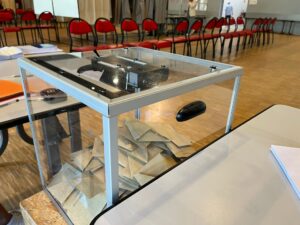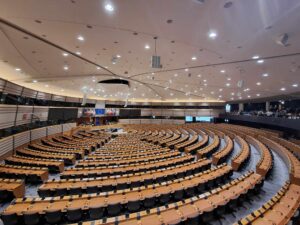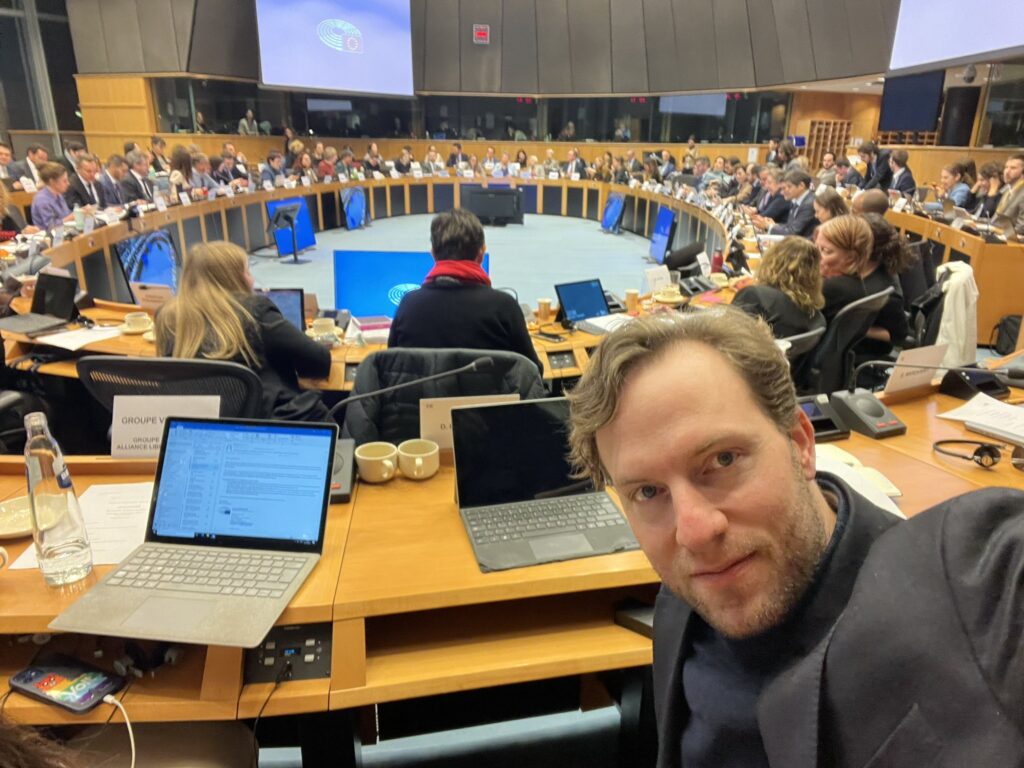–Yagmur: Mr Boeselager, thank you so much for accepting the invitation of CSACTU to have this interview. CSACTU is a student journal covering actuality by its young authors all over France whose main readers are youth. We appreciate the time and commitment you spared for us considering your schedule which we imagine to be very hectic because of the upcoming EU Parliament Elections. We have an agenda on many issues related to the Union. Before we begin, I’d like to ask you to introduce yourself to our young readers kindly. Briefly, who is Damien Boeselager and what does he do?
–Mr. Boeselager: I am a member of the European Parliament and also one of the co-founders of Volt Europe which is a pan-European movement. I work on a lot of issues concerning digitization, migration, asylum, and budgetary affairs but also reforming the European Union which is my core interest to make it stronger, more integrated, and more functioning.
–Y: The very first topic that we’d like to learn more about is the EU Long-Term Residency Directive. Before coming to details on its cancellation, can you please talk a bit about the evolution of the directive and the process it went through vis-à-vis the Council, the Parliament, and the Commission?
–Mr Boeselager: Of course! In 2003, it was adopted for the first time. Since then, there was no update until two years ago. The commission proposed a recast, by basically reworking parts of the directive. What happens afterwards is what always happens with Commission proposals. The law or the revision of the law goes to the two chambers of the EU: The Parliament and the Council. In the Parliament, I was nominated as the lead negotiator and then all the other groups also nominated a negotiator to discuss on what we would like to improve. On the other hand, the Council also did the same last year. It took a bit longer for the Council. We were all ready in April last year but it took until November for them. Then, we finally started to negotiate between the ministers, the interior ministers, and the Parliament.
–Y: Just like you said, you were the Parliament’s lead negotiator on the proposal. We have seen your frustration in a tweet after it was scrapped. You mentioned the pressure coming from the Belgian presidency, the delay of the Spanish presidency in the Council as well as a single country forming a blocking minority. First, to understand how it got canceled, what was the voting method? Was it through a qualified majority or unanimity? And how did we get there?
It’s over 😢
— Damian Boeselager (@d_boeselager) March 4, 2024
Council Pres decided to unilaterally cancel the negotiations on the EU Long Term Residence Directive – mainly because one country lobbied heavily against it (merci beaucoup…)
After years of working on this law, this is a sad outcome.
Statement in committee 👇🏽 pic.twitter.com/BRFbQ7ZUjt
–Mr. Boeselager: Basically, the Council needs a qualified majority while in the Parliament we always vote by a majority. The Spanish Presidency and the Belgium Presidency were very willing to negotiate but there was a country,France, which didn’t want us to move ahead. Plus, there were some other countries that were more hesitant. So this delayed the process under the Spanish Presidency. I think they could have been done already in September but it took them until November. Afterwards, we continued the negotiations with the Spanish Presidency. Then we started a new negotiation with the Belgium Presidency which really tried to not come to an agreement. In the end, they unilaterally decided to cancel the negotiations.
–Y: I was going to ask about that specific country because you haven’t openly mentioned the name but you hinted that it was France. The first question on that is why did you classify it while you mentioned others? Second question, was it unexpected for you ? Were there somehow initial signals? What was France’s position on this directive throughout the process?
–Mr Boeselager: I didn’t mention France specifically because of my official role as the lead negotiator of the Parliament. However, I have no problem telling them the reason or why I think it failed when people like you ask me. It’s clear that France was very much against this directive from the beginning also with some very valid points. Clearly, there is constructive criticism where you try to find an agreement together which is one way to work. Or there’s not-so-constructive criticism where you try to obstruct the negotiations. The French intention was not to come to an agreement before the elections for whatever reasons which is not for me to speculate. Then, it led to the Belgium Presidency having to stop the negotiations because of the pressure.
–Y: Can you specify those valid reasons why France opposed it?
–Mr Boeselager: I think we really need to ask them. I think it can be a matter of mistrust to some other countries. The question is still if you’re willing to find solutions to this or if you just want to put to problems out there. I can’t give any details because I negotiated with the Belgians. I think we need to ask them why they didn’t want to find a common ground.
–Y: As you mentioned before, the directive is actually a recast of the Council Directive of 2003 concerning the status of third-country nationals who are long-term residents which was not performed in great numbers in practice. What impact it could have had on the union in terms of business and investment, intra-EU mobility, and integration of foreigners in the EU, as well as combatting illegal migration?
–Mr. Boeselager: The long residence directive is a status you get after a certain amount of years you spent living in the EU. So, it is related to legal migration and people who have already been living in an EU country for a while. There are millions of people who are eligible for this long-term residency status but it’s a bit underused. I think it is a very cool status and what I have tried to fight for is general and stronger rights so that non-EU citizens receive equal treatment and are treated as equal as possible to EU citizens. I fought for it for the mobility as well. So that before you get the status, you can already go to multiple EU countries and count them as one and get your status easier. After you get the status, mobility makes it possible for you to move from one EU country to another easily. We wanted to ensure that this status is used more in general. The intention is always to make Europe more attractive and to ensure that people who are already living in the Union want to stay.
–Y: How about the current status of the proposal? Did we really kill the bill or are there legal procedures for future opportunities?
–Mr. Boeselager: For now, it’s just on ice.
–Y: I have a final question on this topic before jumping to others. Are initiatives like the « talent poo »l which was proposed by you in 2020, -« the EU job tinder » in other words-, promising for further integration, and can it perform efficiently despite the cancellation of the directive?
–Mr. Boeselager: It is connected but it is a different thing. The Talent Pool is a match of international talent with vacancies in Europe. So this is even before you get any status. The long-term residency status is a visa that you can get after five years. So the directive is the end while the Talent Pool is concerned before these processes. The Talent Pool is a cool thing and I’m very happy to work on it.
–Y: Now we are coming to our hot topic which is the Russian invasion of Ukraine. There have been mixed signals regarding the EU’s response to Russia and its support for Ukraine. We have ideas coming from Eastern and Baltic countries that are more exposed to Russian aggression such as the Cheque initiative of sending non-EU weapons to Ukraine while we have Hungary still having close ties with Vladimir Putin. Do you think Vladimir Putin relies on the disunity of the EU in its commitment to support Ukraine? Do you expect or encourage member states to have a stronger and more determinate tone on the Kremlin?
-Mr. Boeselager: I was one of the negotiators of this EU-Ukraine Facility. I mostly see this through the perspective of numbers. There are many different perspectives to look at this. Last week we exchanged with other committees on budget. From a perspective of numbers, the current deficit of Ukraine is forecasted as 146 billion euros for this year I suppose. The EU-Ukraine Facility can cover this to a certain extent if the US also gives at least 7.6 billion euros. It’s been very tightly knit and it doesn’t include the additional funds the Ukrainian military has been requesting to be able to finance the counter-offense against Russia. I think we are lying to each other in Europe now about what kind of level of support is needed to win this war. I criticize everybody in my own government [editor’s note: the German government] for failing to see the bigger historical picture in this. Also, for failing to really support Ukraine with everything that it needs despite what’s been said. I think there are some people in Europe who would rather see ,whatever they call a “frozen conflict”, than what can basically be a “massacre”. It always exists as a scenario. You are right about Hungary. I think one of the most obvious cases of Russian interference is in Hungary via oil contracts and other forms of influence. That is openly undermining the EU’s and Ukraine’s security interests. But there are also less obvious cases. For example, the German government and others who stick to long narratives as well.
–Y: Do you see a possible confrontation between NATO and Russia in the near future?
-Mr. Boeselager: I think there are speculations about that. Does everything always have to be classified as the Article 5 defense case? No, but there can be heavy infringements of the Baltic security without triggering the Article 5. I am not sure and I am not the best person to answer this question but I don’t think it’s the relevant question right now. The relevant question is to ensure that Ukraine wins its territory back.
–Y: Do you think voicing the option to send NATO troops to Ukraine escalates the tensions or phasing out this probability vocally and openly encourages Vladimir Putin?
–Mr. Boeselager: I’m not an expert on military affairs but I think if you look at the international law you don’t even need any form of NATO decision. Anyone could send troops to Ukraine to just defend the country that is defending itself. So there’s no need to go further than the general cause of national defense if you want to send troops. I think it is not very likely that there will be NATO interventions in Ukraine based on what I see. So I don’t know if it makes sense to speculate about it because I don’t think it is likely that it’s going to happen. Also, this is not something the Ukrainian government is asking for. The Ukraine government has been saying « we are able to defend ourselves if you support us with weapons and cash ». And this is what I think we should be doing.
–Y: There is an apparent division between Germany and France on European defense and support to Ukraine. Germany rejects sending Taurus missiles while Paris does not rule out anything to deter Russia. How do you see the division between France and Germany in this context?
–Mr. Boeselager: They are both not doing enough. France is not delivering the cash and weapons that are needed. While Germany is being idiotic with the Taurus missiles and before with the Leopards and other weapon systems. I think both are failing to see the bigger historical picture. I don’t care about leaders but I care about what will happen in the next 2-10 years
–Y: Russia’s information war and espionage are taken seriously. Politico recently alleged that a Serbian national who is suspected of working for Russia met several EU MEPs. Do you think the EU institutions especially the Parliament are vulnerable to Russian espionage?
–Mr. Boeselager: Of course, but I am not so concerned about the espionage. Because most of the information we have in the EU or the Parliament is public. I am more concerned about the [Russian] influence. I think there are many narratives in Europe and in the Council of the EU that are shaped by Russian propaganda. It’s crucial that we start defending ourselves against the Russian propaganda and interference very fast. I also agree that it’s important that we improve ourselves in cybersecurity and our security against foreign interference by state agents.
–Y: Do you expect a huge voting turnout in the upcoming European elections or do you fear that Europeans may feel disconnected from the EU amid the rise of populism and euro-scepticism?
–MR. Boeselager: I am trying to fight so that people find it more interesting. I think it is a very important election. I think the EU is very powerful by now but people really don’t see it. So this is something I care very much about. That’s why I founded this movement [Volt Europe] to become more European and more able to act.
–Y: I want to ask about the best thing and also the less best thing about being an MEP. Which bloc and political group is the hardest to work in the European Parliament?
-Mr. Boeselager: What’s fun and what I really like is that you have a lot of purpose and you can rewrite and change laws. It’s also very different than the national parliaments. It’s very detailed. It makes me very happy because I know the impact that I have. It’s very clear. What’s sometimes frustrating is that you work within the system and you have to find compromises. But that’s the reality of politics. I don’t work with the far-right and populist groups which are also often Kremlin financed. I don’t really work with them. Besides that, I enjoy working with everyone because I think everyone has the right to exist as a liberal, social democrat, conservative, or multiple. You can have different political views and the beauty of the European Parliament is that you can work across the aisle and understand that the people can have different values or judgements.
–Y: Coming to the end of our interview, is there anything you’d like to add for our young readers on your current projects and future work or anything you’d like to share?
–Mr. Boeselager: I founded this project Volt because I felt that the far-right was advancing. We often discussed that they worked in the interest of making Europe weaker. I really ask everyone to join a political party.










